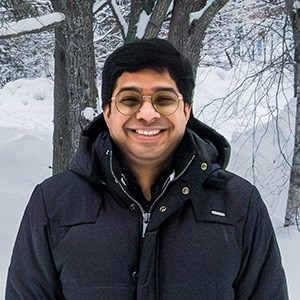Facts:
Title of Vinod Kumar’s project: iCON - Elucidating inner cells contribution to pavement cell shape acquisition in Arabidopsis

Last week, the European Commission awarded 1249 researchers with Marie Skłodowska-Curie Actions postdoctoral fellowships. One of the awardees is Vinod Kumar from Stéphanie Robert’s group at Umeå Plant Science Centre and SLU. He will study how the underlaying cell layers interact with the outermost cell layer of a plant leaf and thus define the specific jigsaw-puzzle shape of this outer cells.
It was an exciting moment for Vinod Kumar last week when he got to know that he received one of the prestigious Marie Skłodowska-Curie Actions (MSCA) postdoctoral fellowship. His first application last year was unfortunately not successful, but it received the “Seal of Excellence” indicating that he had identified a novel research gap in his field which was motivating him to apply again.
“I decided to persevere and keep pursuing this opportunity and began refining my research idea to make a perfect proposal that would go beyond my previous attempt”, says Vinod Kumar who has joined Stéphanie Robert’s group as postdoc in summer last year. “I am very grateful to Stéphanie Robert for encouraging and supporting me throughout the entire course of application.”
Vinod Kumar will investigate how the outermost cell layer of the plant leaf acquire their jigsaw-puzzle like shape. This cell layer forms together with the underlying cell layers an integer tissue that shields the inner parts of the leave from external threats like rain, wind or pathogens. It is still unclear how exactly the integrity of this tissue is maintained and how the specific jigsaw-puzzle shape of the outermost cell layer is acquired.
“Recent results from Stéphanie Robert’s group indicate that mechanical and physical signals coming from the inner cell layers coordinate the development of the outer jigsaw-puzzle shape layer and my focus will to be to identify the signals and analyse the way how they are sent and regulated”, says Vinod Kumar. “The ultimate goal of this project is to generate knowledge that can guide the development of stress resistant crops and trees, contributing to combat global climate change.”
During his PhD and previous postdoc at CSIR-National Botanical Research Institute and CSIR-Institute of Himalayan Bioresource Technology in India, Vinod Kumar gained expertise in crop plants, specifically tomato and rice, studies focusing on root biology and host-pathogen interaction. Now, he plans to expand his skill set focussing on cutting-edge microscopy, cell biology and biomechanics.
“Since my PhD I am intrigued about plant development and the research in Stéphanie Robert’s group immediately captured my interest when I was searching for a postdoctoral position in this field,” continues Vinod Kumar. “UPSC has a well-organized scientific infrastructure with shared equipment and over 30 research groups offering excellent interdisciplinary research opportunities in a multicultural work environment which will be advantageous for my project.”
Being a Marie-Curie fellow brings many benefits aside from the prestige. The fellows get the opportunity to increase their competence and skills through extensive research training, career coaching, mentoring and other transferable skills. Special emphasis is put on interdisciplinary, intersectoral and international experiences aiming to enhance their networking and communication capacities with the science community and with the public.
“The MSCA fellowship does not only offer funding for research and training activities, but it also fosters professional development that is crucial for leading one’s independent research group in the future”, explains Vinod Kumar. “This is something that truly motivated me to apply for a MSCA postdoctoral fellowship. Now that I have received it, it is a crucial building block of my research career.”
The Marie Skłodowska-Curie Actions (MSCA) are supporting 1249 post-doctoral researchers from nearly 80 nationalities. They were chosen from a total of 8039 applications in the 2023 Postdoctoral Fellowship call. The projects selected come from all scientific disciplines. 21.7% are within life sciences like the one from Vinod Kumar which was evaluated with as score of 99.2%.
Title of Vinod Kumar’s project: iCON - Elucidating inner cells contribution to pavement cell shape acquisition in Arabidopsis